Related Research Articles
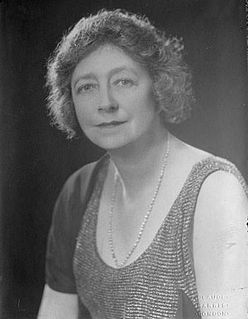
Dame Mary Louise Webster,, known professionally as May Whitty and later, for her charity work, Dame May Whitty, was an English stage and film actress. She was one of the first two women entertainers to become a Dame. The British actors' union Equity was established in her home. After a successful career she moved over to Hollywood films at the age of 72. She went to live in the United States, where she remained for the remainder of her life, appearing in films.
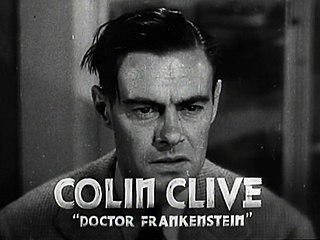
Colin Clive was a British stage and screen actor. His most memorable role was Henry Frankenstein, the creator of the monster, in the 1931 film Frankenstein and its 1935 sequel, Bride of Frankenstein.

John Peter Wearing is an Anglo-American theatre historian and professor, who has written numerous books and articles about nineteenth and twentieth-century drama and theatre, including The Shakespeare Diaries: A Fictional Autobiography, published in 2007. He has also written and edited well-received books on George Bernard Shaw, Arthur Wing Pinero, extensive reference series on the London theatre from 1890 to 1980, and theatrical biographies, among other subjects. As a professor of English literature, Wearing has specialised in Shakespeare and modern drama.

James Alexander Chapman, known by his stage name, Jay Laurier, was an English actor. Early in his career he was a music hall performer, but by the late 1930s he was playing in the works of Shakespeare at the Shakespeare Memorial Theatre in Stratford-upon-Avon as well as having a career in films.
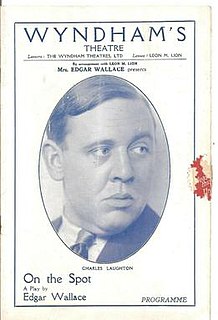
On the Spot is a 1930 Chicago-set play by the British writer Edgar Wallace. Wallace was inspired by a visit to the United States and, in particular, the Saint Valentine's Day Massacre. Known as a prolific author, he reportedly dictated the manuscript for the play in just four days. It was his greatest theatrical success.
The Calendar is a 1929 play by the British writer Edgar Wallace. It is a crime thriller set in the world of horse racing world, the sport being among Wallace's interests. The protagonist is a financially struggling racehorse owner with a shady reputation. It premiered at the Palace Theatre in Manchester before transferring to Wyndham's Theatre in the West End.
The Mouthpiece is a 1930 crime play by the British writer Edgar Wallace. It was one of several theatrical failures written by Wallace following the enormous success of On the Spot, with a plot described as "flimsy".
The Old Man is a 1931 mystery play by the British writer Edgar Wallace. Its original production was staged at Wyndham's Theatre in London's West End for a ninety performance run. It is set entirely in the "Coat of Arms" tavern where a mysterious old man lurks in the background, reputedly an escapee from a lunatic asylum. The original cast included Alfred Drayton, Jack Melford, Harold Warrender and Finlay Currie.
Smoky Cell is a thriller play by the British writer Edgar Wallace first staged in 1930. In America a group of detectives hunt down a notorious racketeer.
The Outsider is a play by the British writer Dorothy Brandon. It portrays the struggle of an unorthodox medical practitioner to gain acceptance by the medical establishment. It was subsequently revised to show the unconventional triumphing over the conventional, whereas the play had originally had the opposite ending.
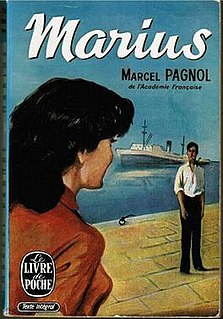
Marius is a 1929 play by the French writer Marcel Pagnol. It takes place in Marseilles, where a young man named Marius working in a café dreams of going to sea, his obsession eventually overcoming his developing romance with Fanny, a local girl.

Behold, We Live is a 1932 play by the British writer John Van Druten. It had an original West End run of 158 performances at St James's Theatre in London between 18 August and 31 December 1932. It was produced by Gilbert Miller. The cast included Gerald du Maurier, Gertrude Lawrence, May Whitty, Ronald Ward and Everley Gregg.
A Song of Sixpence is a 1930 British comedy play by the writers Ian Hay and Guy Bolton. Set in Scotland, it tells the story of three wives who rebel against their tight-fisted husbands.
Orders Are Orders is a 1932 comedy play by the British writers Ian Hay and Anthony Armstrong. A Hollywood film crew takes over a British Army barracks for a film shoot, with chaotic consequences.

A Murder Has Been Arranged is a 1930 thriller play by the British writer Emlyn Williams.
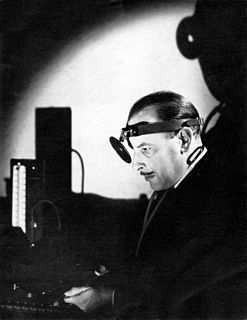
The Amazing Dr. Clitterhouse is a 1936 thriller play by the British writer Barré Lyndon. The lead character's name is a play on the term for the female sexual organ the clitoris - a name characterised by the "yearning, untrammelled nature" of Clitterhouse himself; an extremely daring pun for 1936, yet seemingly anticipated by Lyndon to escape the notice of the contemporary censor. "My view was that he was no more likely to locate the pun in my title as to locate the source of it on his beloved bedfellow", Lyndon 'Fragment of Autobiography'.

Mary Read is a 1934 historical play by the British writer James Bridie and Claud Gurney, based on the life of the early eighteenth century pirate Mary Read.
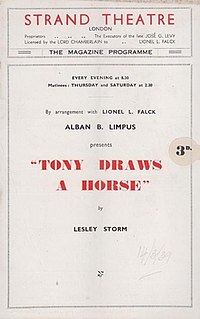
Tony Draws a Horse is a comedy play by the British writer Lesley Storm. It was later adapted into a 1950 film of the same title.

The Innocent Party is a 1938 comedy play by the British writers H.M. Harwood and Laurence Kirk. A woman has to decide whether she is needed more by her husband or her lover.

The Composite Man is a 1935 comedy play by the British writer Ronald Jeans. The lead character is a successful athlete who is assumed to be a genius in everything else, which is far from the case.
References
- ↑ Wearing p.518